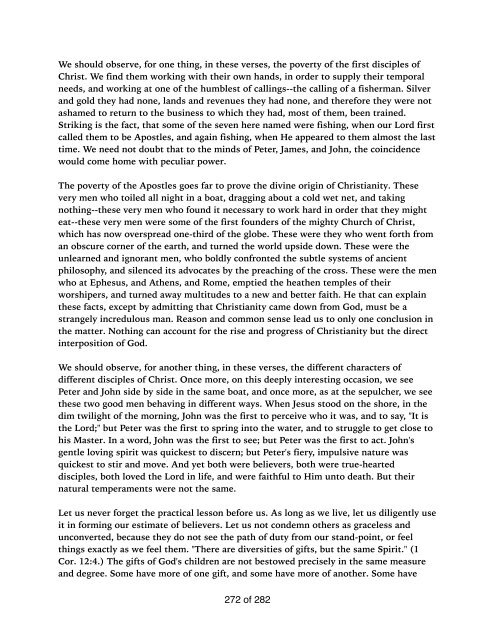The Gospel of John By J.C. ryle
Expository Thoughts on the Gospels Volume 4: John. Ignorance of Scripture is the root of every error in religion, and the source of every heresy. To be allowed to remove a few grains of ignorance, and to throw a few rays of light on God's precious word, is, in my opinion, the greatest honor that can be put on a Christian.
Expository Thoughts on the Gospels Volume 4: John. Ignorance of Scripture is the root of every error in religion, and the source of every heresy. To be allowed to remove a few grains of ignorance, and to throw a few rays of light on God's precious word, is, in my opinion, the greatest honor that can be put on a Christian.
You also want an ePaper? Increase the reach of your titles
YUMPU automatically turns print PDFs into web optimized ePapers that Google loves.
We should observe, for one thing, in these verses, the poverty <strong>of</strong> the first disciples <strong>of</strong><br />
Christ. We find them working with their own hands, in order to supply their temporal<br />
needs, and working at one <strong>of</strong> the humblest <strong>of</strong> callings--the calling <strong>of</strong> a fisherman. Silver<br />
and gold they had none, lands and revenues they had none, and therefore they were not<br />
ashamed to return to the business to which they had, most <strong>of</strong> them, been trained.<br />
Striking is the fact, that some <strong>of</strong> the seven here named were fishing, when our Lord first<br />
called them to be Apostles, and again fishing, when He appeared to them almost the last<br />
time. We need not doubt that to the minds <strong>of</strong> Peter, James, and <strong>John</strong>, the coincidence<br />
would come home with peculiar power.<br />
<strong>The</strong> poverty <strong>of</strong> the Apostles goes far to prove the divine origin <strong>of</strong> Christianity. <strong>The</strong>se<br />
very men who toiled all night in a boat, dragging about a cold wet net, and taking<br />
nothing--these very men who found it necessary to work hard in order that they might<br />
eat--these very men were some <strong>of</strong> the first founders <strong>of</strong> the mighty Church <strong>of</strong> Christ,<br />
which has now overspread one-third <strong>of</strong> the globe. <strong>The</strong>se were they who went forth from<br />
an obscure corner <strong>of</strong> the earth, and turned the world upside down. <strong>The</strong>se were the<br />
unlearned and ignorant men, who boldly confronted the subtle systems <strong>of</strong> ancient<br />
philosophy, and silenced its advocates by the preaching <strong>of</strong> the cross. <strong>The</strong>se were the men<br />
who at Ephesus, and Athens, and Rome, emptied the heathen temples <strong>of</strong> their<br />
worshipers, and turned away multitudes to a new and better faith. He that can explain<br />
these facts, except by admitting that Christianity came down from God, must be a<br />
strangely incredulous man. Reason and common sense lead us to only one conclusion in<br />
the matter. Nothing can account for the rise and progress <strong>of</strong> Christianity but the direct<br />
interposition <strong>of</strong> God.<br />
We should observe, for another thing, in these verses, the different characters <strong>of</strong><br />
different disciples <strong>of</strong> Christ. Once more, on this deeply interesting occasion, we see<br />
Peter and <strong>John</strong> side by side in the same boat, and once more, as at the sepulcher, we see<br />
these two good men behaving in different ways. When Jesus stood on the shore, in the<br />
dim twilight <strong>of</strong> the morning, <strong>John</strong> was the first to perceive who it was, and to say, "It is<br />
the Lord;" but Peter was the first to spring into the water, and to struggle to get close to<br />
his Master. In a word, <strong>John</strong> was the first to see; but Peter was the first to act. <strong>John</strong>'s<br />
gentle loving spirit was quickest to discern; but Peter's fiery, impulsive nature was<br />
quickest to stir and move. And yet both were believers, both were true-hearted<br />
disciples, both loved the Lord in life, and were faithful to Him unto death. But their<br />
natural temperaments were not the same.<br />
Let us never forget the practical lesson before us. As long as we live, let us diligently use<br />
it in forming our estimate <strong>of</strong> believers. Let us not condemn others as graceless and<br />
unconverted, because they do not see the path <strong>of</strong> duty from our stand-point, or feel<br />
things exactly as we feel them. "<strong>The</strong>re are diversities <strong>of</strong> gifts, but the same Spirit." (1<br />
Cor. 12:4.) <strong>The</strong> gifts <strong>of</strong> God's children are not bestowed precisely in the same measure<br />
and degree. Some have more <strong>of</strong> one gift, and some have more <strong>of</strong> another. Some have<br />
272 <strong>of</strong> 282

















